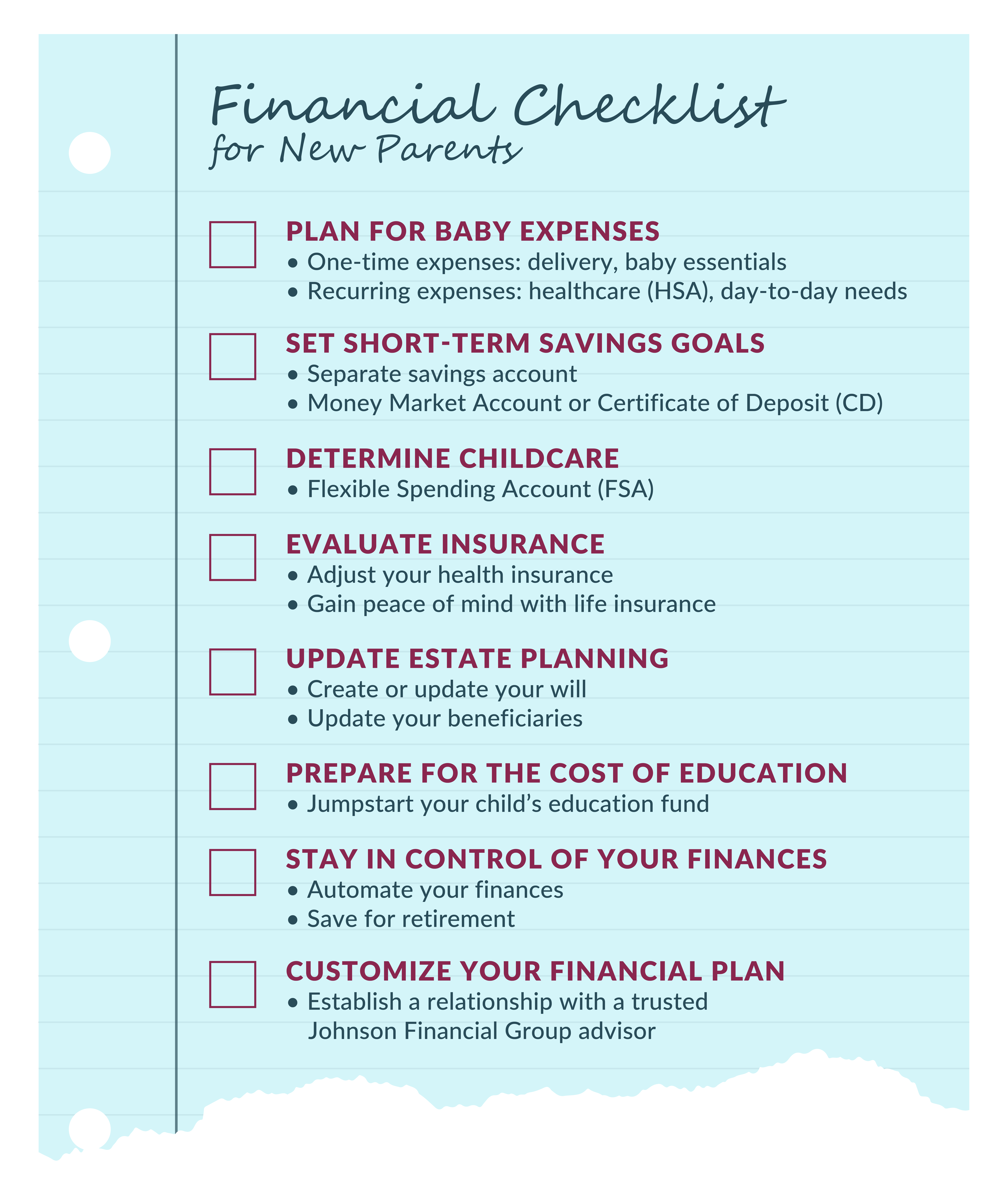SUMMARY
Explore our comprehensive financial checklist for new parents to ensure you're fully prepared for the financial responsibilities of parenthood. From budgeting for baby essentials to planning long-term savings, our guide covers all the crucial steps to secure your family's financial future.
Are you and your partner expecting? Becoming a parent is an exciting – and sometimes intimidating – new chapter. Chances are you’re nervous about your new parental role and responsibilities. Starting or growing your family means a shift in lifestyle along with your finances too.
According to US News & World Report, the USDA estimates that the typical middle-income couple raising a child through adulthood will spend close to $310,000. Of course, various factors like location, income and other choices will impact how much parents may spend. Regardless, it’s safe to say that raising a child is no inexpensive feat.
Research shows that given the same income, people who commit to a financial plan are in a better position to save money than those who have no plan at all. Therefore, it’s important to review your financial picture and the necessary adjustments as you prepare to add a new family member. Jackie Ruppel, SVP, Private Banking Regional Manager, provides insight on decisions you can expect to face when you’re expecting and how you can plan a sound financial future for you and your growing family.
What to (Financially) Expect When You’re Expecting
A shift in priorities
The cost of diapers, bottles and other baby gear can add up quickly – not to mention prenatal care and doctor appointments for your little one. As you focus on new priorities, your budget will naturally shift too. For example, while you and your partner may not have as much time for recreational activities or dining out, funds can be shifted to cover newfound priorities of caring for your child.
The need for an emergency fund
Having a child makes an emergency fund even more critical. Should you or your partner lose or leave your job, or need to take a longer leave than planned, an emergency fund will provide peace of mind. It will also offer an extra layer of security for any medical emergencies or complications. The fund should cover three to six months of living expenses as a cushion for any unforeseen circumstances.
Keeping your budget top of mind
As you’re preparing for your new baby, you’ll need to either create or restructure your budget. Actually, make that two budgets, one for the pregnancy and another for after your baby arrives. Start by tracking your current spending and determine which categories will be added or increase once your child is born. Unsure of where to start? Here’s a financial checklist of important financial items to keep in mind when creating your baby budget:
Financial Checklist for New Parents: 8 Items to Consider

1. Plan for baby expenses
From diapers to daycare, the list of expenses can seem endless. Early financial planning is crucial to manage the costs effectively without overwhelming stress. Setting up a budget specifically for baby-related expenses and exploring various savings options can provide a solid financial cushion. Here are a few items to consider:
One-time Expenses
- Delivery: One of the largest one-time expenses can be the cost of delivering your child, with cost varying based on the type of birth and location of the delivery. In the excitement of bringing your child home, it may be easy to overlook this expense.
- Baby essentials: One-time expenses may include a crib, car seat, baby monitor, stroller and other nursery items, just to name a few. Separate needs from wants and consider borrowing items from family and friends or buying secondhand items to save extra cash.
Recurring Expenses
- Healthcare: Healthcare is one of the largest expenses to consider. While insurance may cover some of the costs, prenatal care will likely involve out-of-pocket expenses. After your child is born, healthcare will be a regular part of caring for your child including consistent child wellness visits and doctor appointments.
- Consider the benefits of a Health Savings Account (HSA): A Health Savings Account can help you save money to pay for qualified medical expenses for you and your child. Withdrawals used to pay for these qualified expenses are tax-free. Another perk is that HSAs may include investment options and employers may contribute to the account as part of the company’s benefits package. Additionally, unused balances can be carried over from year to year and continue to grow on a tax-free basis, even if you change employers.
- The day-to-day needs: Other recurring expenses may include food, diapers, clothing and childcare. With the average parent going through as many as 3,000 diapers in a year, even this seemingly small item can be a shock to your budget. Be proactive and begin planning for these expenses now. What can you start factoring into your current habits and budget today?
2. Set short-term savings goals
For these one-time expenses, consider making short-term savings goals and using tools to automate savings. Setting up a separate savings account can help you set aside money for these baby essentials. You may also consider putting funds into a Money Market Account or Certificate of Deposit (CD) to grow your money and avoid the temptation to spend the funds.
3. Determine childcare
Consider your long-term plans. Will both parents return to work after any maternity/paternity leaves? If so, it’s necessary to evaluate childcare options well in advance. Newborn care can be costly and often in short supply. If one spouse will not return to work, the loss of income should be factored into the budget instead.
- Flexible Spending Account (FSA): As a new parent, one of the greatest advantages of an FSA is the ability to pay for childcare expenses. Consider setting up an FSA, a pre-tax account sponsored by an employer, if one is available to you. Unlike an HSA, FSA funds do not carry over as an investment option year after year. If funds are not used by year end, you will lose them.
4. Evaluate insurance
Welcoming a new baby into the family prompts a thorough review of health and life insurance needs. It's essential to ensure that your health insurance plan covers prenatal care, childbirth and pediatric care for your newborn, as well as ways to plan for unforeseen circumstances during this joyous, yet transformative, time.
- Adjust your health insurance: Between three and six months of pregnancy, speak to your employer and health insurance provider. Ask for specific directions on how to add your child to your healthcare plan. Most health insurance companies require you to notify them within 30 days of your child’s birth. You will also need to select a pediatrician within your network. Make sure to account for an increase in monthly premiums upon adding your child to the plan.
- Gain peace of mind with life insurance: Especially as you grow your family, life insurance is a fundamental part of a financial plan. If something unexpected happened to you, can your family maintain their current standard of living? Life insurance provides security for your family and can be a means to leave an inheritance to your loved ones outside of your assets.
5. Update estate planning
It's important to update your will and other legal documents to include your new family member, ensuring they have guardianship and financial security should anything unexpected happen. These adjustments help provide a structured estate plan to support your family’s needs over the long term.
- Create or update your will: This is not a fun topic, but a necessary one. A will allows you to name a guardian for your child’s care and designate who will handle your finances – and your child’s – if you pass away unexpectedly. As a parent, it can give peace of mind your child will be cared for by someone you trust and that their finances will be handled in the manner you wish.
- Update your beneficiaries: This includes your 401(k)s, IRAs, insurance policies and trusts.
6. Prepare for the cost of education
It’s difficult to look past diapers and the potty-training stage but the years will go faster than you think. While saving for your child’s future child expenses may not seem like a priority right now, with college expenses currently averaging $54,880 a year at private schools and $26,820 for in-state public schools, it’s never too early to start saving for college.
- Jumpstart your child’s education fund: A 529 Plan is an education savings plan that allows you to save and grow money on behalf of your child. Growth is tax-deferred, provided it is used for qualified educational purposes, such as tuition or books. There are no minimums, which means you can contribute a lump sum or a small amount monthly out of your paychecks. Starting to save early gives money time to grow and can set your child up for future success.
7. Stay in control of your finances
Having a baby introduces new financial responsibilities, making it crucial to stay in control of your finances during this significant life change. By planning ahead and adjusting your financial strategy, you can ensure you meet your family's needs while maintaining financial health.
- Automate your finances: As a new parent, your days will look a little different. In this busy season, take advantage of online and mobile banking tools like online Bill Pay and efficient payment services like Zelle ® to track your expenses and pay the bills. These tools allow you to multi-task and manage your money when and where it’s convenient for you. A bonus is that babysitters may often prefer electronic payments instead of cash too.
- Save for retirement: While your child has become your number one priority, it’s still important for you and your partner to save for retirement. This includes contributing to your company’s 401(k) or retirement savings plan while building a relationship with a trusted financial advisor.
8. Customize your financial plan
Having a child is a major milestone that will impact your daily and long-term expenses. Establishing a relationship with a trusted advisor is critical to your long-term financial success as you enter this new stage of life. We can help you create a financial plan to ensure you are on track to achieve your financial goals. As life happens, we’ll help you adjust your plan over time and customize it to your unique needs. To learn more, connect with a Johnson Financial Group advisor today.
ABOUT THE AUTHOR

SVP Private Client Banking Leader | Johnson Financial Group
As Senior Vice President, Private Client Banking Leader, Jackie works with clients to help manage their complex financial needs with solutions designed for their individual situation. She takes pride in providing a professional, personalized level of service when and where it is convenient for her clients. Her collaborative approach leverages the expertise and resources from a team of advisors to ensure you achieve your financial goals. As a Certified Wealth Strategist®, Jackie draws upon her in-depth financial knowledge of banking and lending to provide valuable solutions for clients.

